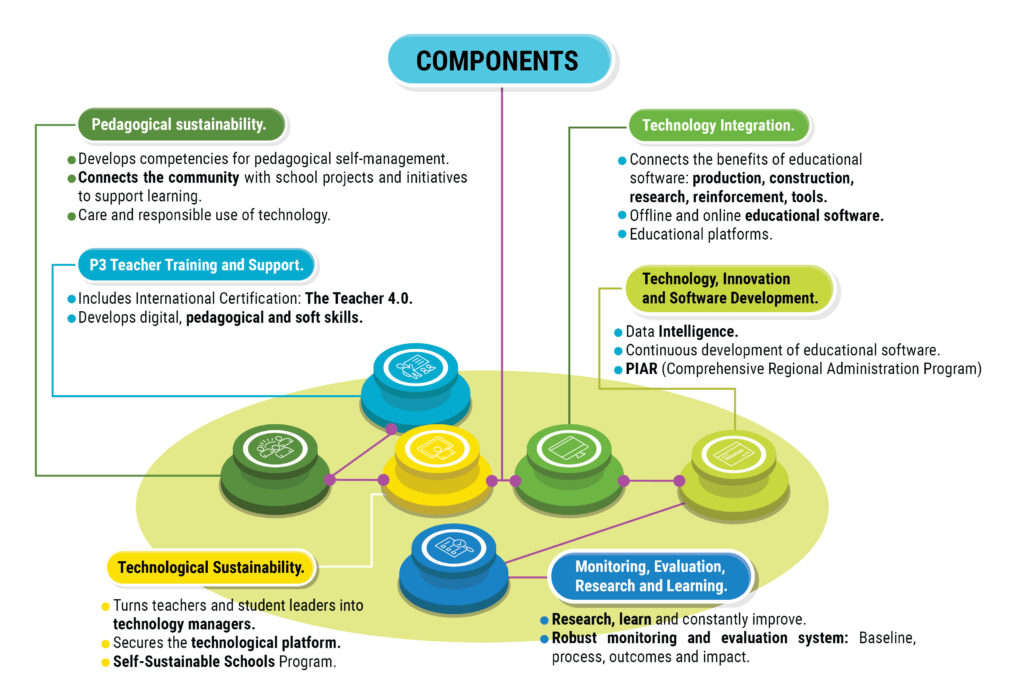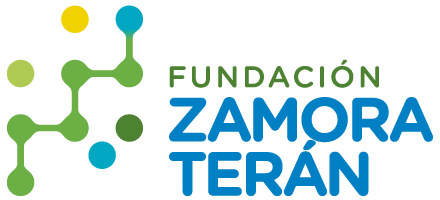What we do?

Conecta Aprende Program
The Conecta Aprende Program has been implemented in Nicaragua and Honduras since 2020. Its objective is to improve literacy skills, with emphasis on fluency and reading comprehension in primary school students, through the promotion of teaching practices supported by evidence.
-What does it seek?
To develop the profile of the 21st century teacher or teacher 4.0 (a digital citizen, a Humanist 360 teacher and a Manager of Meaningful Learning). A teacher capable of positively impacting student learning with a focus on literacy.
-Why?
To improve literacy skills, focusing on reading fluency and comprehension in elementary school students, through sound pedagogical strategies, integration of educational technology and the strengthening of teacher professional development.
-What is the strategy?
The Conecta Aprende Program comprises 3 core phases:
- Transition to the digital school.
- Focus on strengthening the teacher’s methodology.
- Articulation with the educational community.


Hub Edutech
Edutech Hubs are alternative education centers that customize, adapt and develop technical and soft skills, adapt and develop technical and soft skills, according to the characteristics and/or needs of the characteristics and/or needs of the beneficiaries, through a practical-experiential approach. practical-experiential approach.
-Objective
Provide more and better economic opportunities through the promotion of a culture of entrepreneurship and the promotion of a culture of entrepreneurship and the strengthening of 21st century 21st century competencies with the integration of 4.0 technologies for education and employability.
These community innovation centers help to reduce the gaps for 21st century learning through the 21st century learning, through educational reinforcement, as well as to develop digital citizens that stimulate digital citizens that stimulate the community transformation of their environment through of their environment, through 5 priority axes:
-Educational leveling
Strengthening reading fluency and reading comprehension skills at the literal and inferential levels. reading comprehension at a literal and inferential level.
-Humanizing Robotics
STEM approach to problem solving.
-Programming
Promotion of computational, logical and critical thinking.
-Soft skills
Focus on personal and professional development of beneficiaries.
-Digital skills
Literacy for digital transformation.

Educational Community
– Faculty Training and Support
51% of 10 year old children in Latin America and the Caribbean cannot read and understand a short text: according to the World Bank they are in an educational crisis. We have always believed that teachers are our principal allies to change this reality and that’s why we dedicate to them a large part of our effort. For many years we have accompanied them closely, in their schools, with mentoring, training resources and professional development tools. Now FZT´s educational model of virtual learning seeks to generate a greater impact on the quality of the processes and the number of beneficiaries. Our virtual educational model seeks to accompany the teacher from the development of a digital fluidity to the methodological dominion of their disciplines and the continual improvement of their important mission.
– Families
Families that learn together are families that succeed together, that built a better future for all of its members. We are convinced of this.
From the beginning of our work we have been very conscious of the importance to integrate families to the educational process through an integral digital literacy. Mothers, father and grandmothers have beek key in the growth of our educational model, participating in formative workshops, continually consulting with teachers and consultants from the Foundation to help girls and boys in their school work and in the permanent and significant learning process that can be achieved through a good use of mobile technologies.
– Communities
We believe that communities learn with children and that knowledge is built in community. We want to form leaders that our communities need and that is why it’s important to integrate different community actors in our projects as an integral part of the educational ecosystem that we impact through the inclusion of technology as a learning tool. The communal educational projects form part of a strategy to generate leadership in students, while soft competencies are developed through teaching-learning processes with an interdisciplinary focus that incorporates the use of technology, with the objective to always solve real needs present in their communities and schools. These are projects that teach how to learn and serve.
– Volunteers
Our growth is due in large part due to the work of thousands of volunteers that with great enthusiasm add their knowledge and efforts to improve the education in Central America. In retribution to their commitment we designed a volunteer training program for collaborators geared towards their professional development and thus give back with gratitude their generous contributions. This program incorporates courses on soft skill and design thinking.
– Lafise Training
The Professional Development Program of Grupo Lafise incorporates all of our experience and versatility to guarantee the development of competencies that XXI bankers require. We designed a robust, ambitious and pertinent program to positively impact human talent and the business areas from the Lafise Group that our sisters and principle allies for the development of our projects and programs for the benefit of children. With our technological resources and the good design of our learning resources, we facilitate the formative processes in real time and keep up with the pacing of our collaborators. The PDP seeks to facilitate the learning of methodologies, processes, concepts, skills and competencies that will improve the quality of the services and products that Lafise provides through the development of its people.

Steam
– Importance
Science, technology and the humanities are necessary for the development of a good education. That is why we promote the learning of science and mathematics in all of our interventions.
Technology has always been a great ally of our work. Computers and robots have been with us for more than 10 years as tools that facilitate collaborative and significant learning in different contexts. We use the sciences, technology, mathematics, engineering and art.
– Approach
The STEAM approach attempts to achieve integrity and transversality in the learning process to make them more significant and easy to adapt to the contexts from where the students come from, facilitating the resolution of problems, the development of projects, collaboration and innovation.
– Projects
Not only do we promote the development of skills related to science, engineering, mathematics or technology in schools, we also take these ideas to the homes, communities and other places such as our Innovation Center.
We develop workshops, competencies and events where we promote the use of programming and robotics for learning and the solution of real problems in real contexts. Children, young adults and teachers have participated in our training and STEAM promoted projects with great success, innovative spirit and entrepreneurship.

Monitoring, Evaluation, Research and Learning
– Importance
According to the World Bank (2018) the indicator of poverty in education for children less than 10 years in countries with low to medium incomes is 53%. This data is very similar in Latin America (51%) and although it´s less than the world´s average, it’s not very far from it, thus alerting to take measures; not taking action will put the countries´ future in jeopardy.
– Approach
We guarantee the impact and quality of our actions with data. Our team of experts researches, designs and implements robust strategies to monitor and evaluate the work that we do in distinct educational contexts, whether it´s with children or adults, in a live or virtual setting.
– Projects
Since a long time ago we evaluate all of our formative actions in order to be responsible, while attempting to achieve the greatest efficacy, efficiency and transparency.
We have successfully evaluated processes of long duration financed by international cooperation agencies, as well as national and regional interventions from technological educational programs in formal and non formal settings. By the same token, we have been consequent and rigorous in the evaluation of teacher training and follow-up programs to improve the development of managerial skills in the educational centers where we work.
– Services
The experience and the knowledge of our monitoring and evaluation team allows us to offer high quality services that companies and organizations can also use to measure the impact of their projects and find evidence of strengths and opportunities for improvement.
In the last years we have worked with businesses of international prestige in various countries in the region and we continue in constant training and research to always offer the best services, in accordance with the latest tendencies for evaluation and its international standards.

Sustainability
We have incorporated a sustainable approach to all of our actions, from the ones related to educational aspects to the maintenance of our technological equipment, with the objective of being responsible in the use of the resources in order to maximize a positive impact and their benefits. Related with technology we believe that teachers, families and children are also our allies to increase the useful life of the technological equipment that we use in our operation. They learn about the maintenance of the computers in a way that allows them to disarm, repair and assemble the devices without risk nor problems. They do it always with a great spirit for learning and collaboration.
With the educational approach, we develop local capacities in all of the areas that we work. Our educational consultants help teachers from the countries where we work to also become trainers of other teachers, to become agents of change that can impact in a positive way their communities and educational circuits, generating innovation, sharing resources, good practices and experiences.
Gratitude and responsibility are in our DNA. Every dollar that goes into the Zamora Teran Foundation is used with great responsibility to maximize its impact and benefits in favor of children in the region. We promote healthy communication with our donors and a strict management of the resources that are confided to us.
Finally, volunteering has been a truly important to us. The mutual relationship with the volunteers has been key to the growth of our Foundation. Through the years we have happily received the support of thousands of volunteers that each year join the cause of a more inclusive education with quality for the children of Central America. Students, professionals, collaborators from companies and families of the benefitted children have come to work shoulder to shoulder with the team from the Zamora Teran Foundation in the development of multiple activities that guarantee the sustainability and efficiency of our operation.

